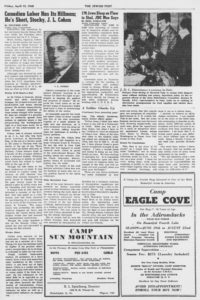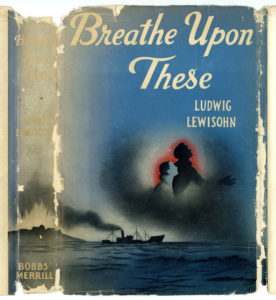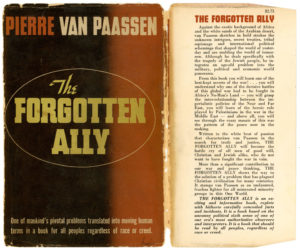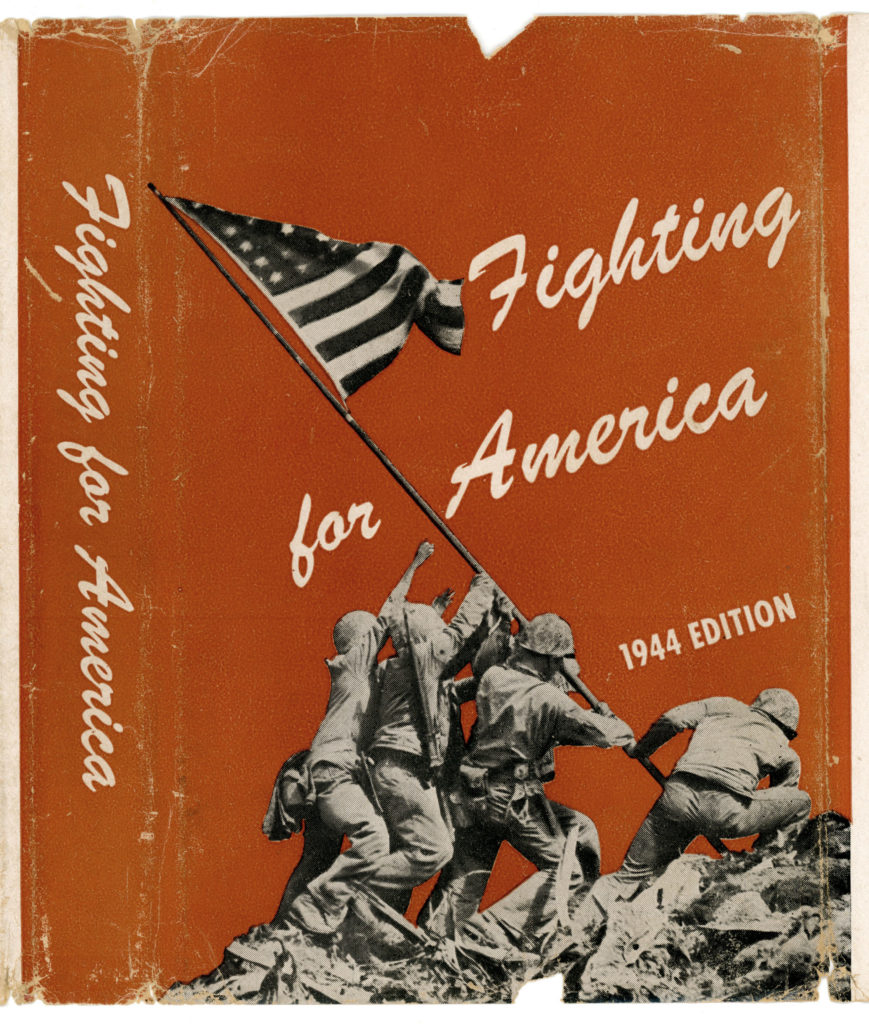Through the lens of the past, one can discern the present.
And from the vantage of the present, the nature of the past can become clearer.
Case in point, novelist, short story writer, and screenwriter Michael Chabon’s speech at the Hebrew Union College graduation ceremony on May 14, 2018. Akin to the aphorism about a “talking dog” – that far more startling than the poor quality of its speech is the mere fact that it’s even capable of talking at all – the most remarkable aspect of Chabon’s address was that – as much as its very content – it was given in a venue that was (is?) “Jewish”. Truly remarkable in his ignorance of Jewish history in general, let alone the history of the re-established nation state of Israel in particular, the animating ethos of Chabon’s talk can best be understood as the legitimation and praise – if not the moral imperative (in a Kantian sense) – of Jewish self-negation, both individually and collectively.
Here’s Chabon’s speech, which can be found at Rando Namo’s YouTube channel (uploaded May 21, 2018) under the title “Hebrew Union College Graduation Ceremony Clip”.
Michael Chabon’s peroration elicited numerous insightful reactions, impassioned as much as analytical (links are given at the end of this post). Perhaps the best is D.G. Myers’ Michael Chabon’s Imaginary Jews, from the Fall, 2008 issue of the Sewanee Review. Equally telling is Rabbi Ammi (Ammiel) Hirsch’s September 19, 2018 Yom Kippur Sermon: “From the Ghetto”, at Stephen Wise Free Synagogue. …
In these reflections of, and reflecting upon, Chabon’s speech I’m reminded of the lyrics to John Lennon’s 1971 facile Yoko-Ono-inspired-ode to collectivism, and, the jettisoning of human particularism, in favor of the nullifying pleasure of a soporific universalism: “Imagine“. I know I “heard” this song as far back as the early 70s (seriously! … even as a kid I found its airs of grandstanding moral nobility and near-pathological idealism to be disconcerting – though I didn’t know the words “pathological”, “idealism” and “disconcerting” back then!), but it’s true implications weren’t apparent until I viewed the 1984 movie “The Killing Fields”, in which the Lennon / Ono ode accompanies the film’s concluding scenes. It was here, through the cinema, that the banality, utter shallowness of thought, and especially the totalitarian brutality lurking behind the lyrics’ false sweetness was fully crystallized. For naively or intentionally, what this song was extolling was a mechanistic view of reality, the abolition of individual human endeavor, and, the suppression of all national identities, the results of which have been amply evident (and were ongoing even as the song was released in the midst of the (first?!) Cold War!) throughout the twentieth century, to the “tune” of tens of millions dead.
For your consideration, the lyrics follow:
Imagine there’s no heaven
It’s easy if you try
No hell below us
Above us only sky
Imagine all the people
Living for today… Aha-ah…
Imagine there’s no countries
It isn’t hard to do
Nothing to kill or die for
And no religion, too
Imagine all the people
Living life in peace… You…
You may say I’m a dreamer
But I’m not the only one
I hope someday you’ll join us
And the world will be as one
Imagine no possessions
I wonder if you can
No need for greed or hunger
A brotherhood of man
Imagine all the people
Sharing all the world… You…
You may say I’m a dreamer
But I’m not the only one
I hope someday you’ll join us
And the world will live as one.
Then again, I’ve always felt the pop-culture – and not just the pop-culture! – fascination with The Beatles to be perplexing. (Blasphemy, blasphemy!)
Oh. Yes. Getting back to Michael Chabon’s speech…
Thinking about the ideological currents contributing to his thinking, I’m reminded of an essay that appeared on April 13, 1945, a month before the end of the Second World War in Europe, in the Indiana-based The Jewish Post, which is currently published as The Jewish Post and Opinion. Written by Bertram A. Rosenberg and entitled “A Soldier Checks Up on His Buddies to Discover What Kind of Future in Store for U.S. Jewry”, the essay takes the form of a series of vignettes, eleven in number. Through these, Rosenberg relates his observations of the interaction of Jewish soldiers in his unidentified unit with and among Jewish and non-Jewish soldiers and civilians in settings both military and civilian. He also presents comments made by Jewish soldiers – discretely recorded, I would think! – that were expressed in unguarded reflection about their perception of themselves, other Jews, and the political and military situation of the Jewish people “in general” during the war’s final year.
Of central note is the fact that absolutely none of the eleven incidents … musings … conversations (call them what you will) recounted below pertain to antisemitism as directly experienced by these soldiers. Though we have no way of knowing how random, representative, or dramatically selective is this “portrait” (I think it’s truly random), distinct themes emerge from Rosenberg’s essay: The degree to which the identity of these men was derived not through the prism of their own identity, ancestry, and heritage, but instead, from assumptions of how they assume others perceived them. … The degree to which some wish to consciously jettison or escape from any sense of identification with the Jewish people. … The attribution of antisemitism to the behavior of Jews themselves. … The ineffectiveness of educational efforts to impart a sense of Zionism, and, Jewish history. … Juxtaposed against these observations are a small few in which efforts towards a positive, confident, and assured Jewish identity are described. This is particularly so in the last vignette, in which a colonel in the Medical Corp admonishes his men: “We have nothing to apologize for. It is impossible now to elaborate upon two thousand years of religious faith, but enough to say that, you fool nobody, not even yourself, whim you deny your birthright.”
Rosenberg’s conclusion is ambiguous: “I hesitate to enforce an all-inclusive conviction. I am reminded of the story of the blind men, who attempting to describe an elephant, found different points of emphasis and drew pictures in accordance with their sensitivity of experience. I do know that U.S. Jewish youth needs a new, different, more militant type of manhood. Being a Zionist, I know of one such type, possibly all-inclusive.” He closes with words from his brother: “We, the Israelites, need a Jewish-American manhood, that understands its responsibilities, accepts them and perceives the pleasures of our tradition, not solely the difficulties of it.”

Here’s Rosenberg’s essay, which is as relevant in 2024 as it was seventy-nine years ago:
A Soldier Checks Up on His Buddies to Discover What Kind of Future in Store for U.S. Jewry
Bertram A. Rosenberg
The Jewish Post
April 13, 1945
ONE Sunday morning I awoke with a mission. I was going to find out, the extent of Jewishness, among my buddies, to learn of their background, Jewish education, awareness of Jewish problems, closeness of Jewish associations, and so on.
“Crazy fool,” strange interlude number one within me spoke. “Crazy fool, leave well enough alone! Leave well enough alone.”
“After all,” strange interlude number two spoke. “After all upon the thoughts of these youth, representative of all sections of the country, will depend the sort of Jewish life that will be led in America. And if you want to have a part in the destiny of your people, you should know the ways of their lives.”
Herewith I wish to assure all aspiring psychiatrists who desire to send me letters of advice and treatment that through the judicious use of non-habit forming opium, laudanum, cocaine, 3.2 per cent beer, intravenous morphine injections, I have cured myself of the delusions of “strange interlude.”
A Tall Assignment
“This is a tall assignment I says to me, so big, so subject to untrue generalities, so unscientific, so devoid of a beginning or an ending, a “rishon or a sof,” that only you would undertake it. You will start from the middle of an ocean, longitude zero, latitude zero, and descend downward, losing air, choking for sense, finding yourself swimming in four directional current, going up, going down, and wondering when the lifeline of common sanity will snap. Being human, thus lacking the fundamental annual sense of good and bad, I went ahead regardless.
In writing of what happened, I decided that I would quote various incidents written down in my black book and let the reader draw his own interpretation of their meaning. As for me, I was definitely swayed by what I had noted. After just a cursory landing on the “island within,” the footprints upon the beach, told me what I wanted to know…
Incident I …
“I feel that there are three hundred and sixty pairs of eyes watching our movements,…”
Our Jewish group of 25 men out of a total assembly of 360, were lined up in military formation, to march over to visit the chaplain. We, the Jews, led the parade, we the twenty five, because our chapel for today was the nearest. A young Jewish soldier alongside me said:
“I feel that there are three hundred and sixty pairs of eyes watching our movements, watching our cadence, watching our smartness, watching … whispering … criticizing … of course this is the super imaginative phantasy of my eighth sense, but it is a concrete disturbance.”
Incident 2 …
“I’m roped in.”
Our group deported from the others and as we awaited entrance to the chapel, one of the Jewish boys hollered out to a pal of his in the Christian columns:
“I’m roped in.”
As an honest, manly extension of this, he might have said:
“Listen, you Christians, I’m not here because I want to be. I’m not one of these Jews. I’m roped in because we were ordered to be here.”
Incident 3 …
“Yep, it’s peculiar, well when my father-in-law dies, I will be free.”
Before going into the chapel, one John Smith explains to all of us:
“Yep, nobody believes I’m Jewish. Why when I was to be married, my father-in-law thought me a “goy.” Yep, it’s peculiar, well when my father-in-law dies, I will be free.”
Incident 4 …
“…when such a thing happens it is best to leave it alone,
to let it go,
to avoid all trouble,
to let the matter drop,
to act as if nothing happened.”
Suddenly one of the boys motions for all of us to assemble in a small circle. We go underground to listen.
“Listen, fellows. I have something to tell you. One of our soldiers in barracks got up today and read a poem, a soldier’s hymn, contents being that the Christians fight while the Jews buy bonds. Fellows, when such a thing happens it is best to leave it alone, to let it go, to avoid all trouble, to let the matter drop, to act as if nothing happened. After all aren’t there many jokes about the Jews we tell ourselves. I know this kid. He even says “Sam Goldberg is his best friend.”
Incident 5 …
“Some of you say that even if you don’t believe in religion,
you should attend services to gain the respect of your Christian pals,
but what respect have you gained by having your face slapped.”
One of the boys replies:
“Listen, fellows, you guys that say hush-hush this affair are cowards. When that fellow read his poem you had not time to rationalize, to debate the wisest course of action, because this was a stimulus to your emotions, it was a split second affair, and if you hid under your cover, plugged your ears with your fingers, or bent down to tie your shoe lace, or walked out of the room, then you showed physical and menial cowardice. You had no time to think, you had only time for your Jewish conditioned background to activate your reaction. It was as if a hot iron were touched to your hand. The resultant action is based on muscular reflex, conditioned by your experiences with fire and heat. Sure you hid under your covers. Just as you have been hiding ever since you understood you were Jewish. You have no pride in your Judaism. Some of you say that even if you don’t believe in religion, you should attend services to gain the respect of your Christian pals, but what respect have you gained by having your face slapped.”
Incident 6 …
“In fact, it is a shock to learn that twenty five years of Zionist propaganda,
of current events of American English articles, of books,
has not conclusively reached into the heart of Chicago …
outlands of New Jersey …
southern Florida hand-clapping Texas …
cold Massachusetts.”
After chapel services a discussion initiated by the chaplain was held. The topic chosen was “Regimented Prayer.” From out of nowhere a disturbed soul asks:
“Chaplain, what is a Zion … a Zionism … a Zio –”
The chaplain jumps to the rescue and adds:
“A Zionist”
“Yes, sir.”
“A Zionist is a person who wants the Jews of Europe to find a home in Palestine. Although an American Zionist is one who does not want to go there.”
A second voice says:
“Isn’t a Zionist, one who wants to kick the Arabs out of their land?”
A bright, young man astounds the gathering, Klal Israel, with the important piece of information:
“Pierre Van Paassen’s book, “Days of Our Years,” has the answer to that.”
A third voice says:
“Isn’t Biro-Bijan a Zionist state?”
So it goes, wholesale uninformativeness. It surprises one. In fact, it is a shock to learn that twenty five years of Zionist propaganda, of current events of American English articles, of books, has not conclusively reached into the heart of Chicago … outlands of New Jersey … southern Florida hand-clapping Texas … cold Massachusetts.
Incident 7 …
“See, that’s what I mean.
It is that type of Jew, dirty, begging, conspicuous, that causes anti-Semitism.
I don’t blame the Gentiles.”
Last night three of us Jewish boys went to a show. While on the way, we were cautiously approached and stopped by a bedraggled, hunched over moth-eaten man whose face bore marks of Jewish suffering. At first we intended brushing him aside, but to test my friend’s reactions, I said:
“Let’s buy a paper.”
“All right,” said pal one, “but I have no change. Will a dollar bill do?”
The man nodded, “No.
“’Here’s a dime,” I volunteered. “Let’s give it to him and forget the paper.”
“No, thanks, boys,” the man hastened to say, “I sell papers.”
“Du bist a Yid,” I said in pidgeon Jewish.
“An alte Yid,” he responded.
My friends demanded a halt to the conversation, appearing embarrassed, and cautioning me to speak softly. When we finally were out of earshot, one said:
“See, that’s what I mean. It is that type of Jew, dirty, begging, conspicuous, that causes anti-Semitism. I don’t blame the Gentiles.”
Incident 8 …
“We had gone “over the hill” from GI chow, and were seated in a Jewish restaurant, awaiting the entree of chopped herring. Each of us had been supplied by the observant proprietor with a drip-pan placed snugly against the lower lip, Ubangi style, into which fell the tidal wave of anxious saliva. One of the more daring boys had secured a bottle of Canadian Club, and asked the proprietor whether we could make a toast, the answer being:
“If I can’t see it, can I see it?”
Which translated into good English, means:
“If I can’t see it, can I see it?”
We lifted our glasses to a position Just on the level with our eyes (seeing is believing).
“Rebenishelolam.”
“Rehenishelolam,” I repeated, “what’s that?”
“Oh,” he replied, “that’s the Jewish toast for drinking.”
“Do you know what that means?”
“No,” he answered, “but my grandmother always said it at home.”
“You’re mistaken,” I said, “the word is ‘Lechaiim,’ to health. You were calling upon the Lord’s name.”
Nevertheless, the Canadian Club tasted good. Indeed after awhile we were amazed to find that the proprietor had installed a revolving cuisine. Or so it seemed.
Incident 9 …
“What do you guys want to do, prove this is a Jewish war?”
One day after a very impressive chapel service, during which the chaplain read of the “Heroes of the Battle of the Warsaw Ghetto,” with the tune of the Young Judean version of “Adon Olam” ringing in our ears, we made our way back to our barracks. There my friend found an old harmonica and commenced to give out with all the Palestinian chants he and I knew. Anu Banu Artza, Avinu Malkenu, Hineh Matov … It was not more than three songs and two bars of “Yerushalyium” later, when the section chief, a Jewish lad, cautioned us to quiet. Revolt flared up within us, this Sunday, and we continued.
Again the section chief emerged from his shell, and cautioned:
“What do you guys want to do, prove this is a Jewish war?”
Incident 10 …
“Fine Jewish boys met death with a “Shma Israel” on their lips,
and a Mezuzzah in their hands.
And here in these very halls…”
Our camp had a very fine library. Well, this day I walked in intent on securing Ben Hecht’s “Guide to [sic] the Bedevilled,” or Ludwig Lewisohn’s “Breathe Upon These“, or Pierre Van Paassen’s “Forgotten Ally,” when I observed and promptly snatched, or should I say snitched a booklet, “Fighting for America,” put out by the National Jewish Welfare Board.
As I looked through this history of brave fighting Jews and feverishly scoured the “missing in action,” the “died for their country” columns, I was aware of a sniping over my shoulder. A voice inquired:
“May I read it next?”
One day later, the booklet was returned to me with an enclosed note.
“Dear Bert,
I showed this booklet to several Jewish friends of mine and the consensus of opinion was that it is a waste of valuable paper. Why do certain people insist upon separating us Jews into a distinct grouping? This showing of our differences results in special attention to us. We need less of this.”
I venomed. Fine Jewish boys met death with a “Shma Israel” on their lips, and a Mezuzzah in their hands. And here in these very halls…
______________________________
Here are covers of the books referred in the above vignette. They’re all from my library. (Yes, I like books.)
A Guide for the Bedevilled
Charles Scribner’s Sons, New York, N.Y., 1944
__________
Breathe Upon These
Ludwig Lewisohn
Bobbs-Merrill, Indianapolis, In., 1944
__________
The Forgotten Ally
Pierre van Paassen
The Dial Press, New York, N.Y., 1943
__________
Fighting for America
A Record of the Participation of Jewish Men and Women in the Armed Forces During 1944
The National Jewish Welfare Board, New York, N.Y., 1944
______________________________
Incident 11 …
“We have nothing to apologize for.”
At services today, a colonel of the Medical Corps was among the worshippers and was requested by the chaplain to give his greetings. This elderly, handsome, neatly attired officer spoke:
“Fellow Jews, I think that what I have to say will be a Testament of Faith. Mind you I’m not a Holy Roller, but what I have to say, I believe in. Don’t be ashamed of being a Jew. Many of the boys who come to the medical training school are ashamed of being Jews, they try to hide it. As for me, I have always found a great source of spiritual strength in my religion. I have a Jewish home and intend to bring up my little family as Jews. We have nothing to apologize for. It is impossible now to elaborate upon two thousand years of religious faith, but enough to say that, you fool nobody, not even yourself, whim you deny your birthright.”
These are just eleven incidents, but easily multiplied by four score and seven, that like organic pain, are symptoms of unhealthy disturbances in U.S. Jewish life. This is not news. But the Army Express carries one over the broad land, throwing unassortedly man upon man, given the opportunity for a study of altogether different unlocalized human beings from Maine to Florida, from Washington to Texas, from California to New York.
Draws No Conclusions
This, then is my stay of “GI Jacob,” as I found him. From these “Incidents,” can be drawn a pretty fair diagram of Jewish-American youth as Jews. I, for one, am a poor artist. I leave the color, strong lines, weak lines, emphasis of profile, to the Jewish socio-religio experts, who in their own accepted learnings, will draw it out as it affects them.
I hesitate to enforce an all-inclusive conviction. I am reminded of the story of the blind men, who attempting to describe an elephant, found different points of emphasis and drew pictures in accordance with their sensitivity of experience. I do know that U.S. Jewish youth needs a new, different, more militant type of manhood. Being a Zionist, I know of one such type, possibly all-inclusive.
One word then, before I leave, one thought, that my brother so ably writes, from an army camp somewhere in the world:
“We, the Israelites, need a Jewish-American manhood, that understands its responsibilities, accepts them and perceives the pleasures of our tradition, not solely the difficulties of it.”

Here’s the original article as it appeared in The Jewish Post…


Let’s return to 2023 and 2024.
What conclusions can we draw from the intersection of Bertram Rosenberg’s article of 1945 and Michael Chabon’s speech of 2018? The opinions about Jewish identity, and survival, versus the ideology of self-negation that Chabon espoused in his commencement address didn’t solely arise from within his (and I quite eye-rollingly admit, my) generation, or, spontaneously spring from the ideological aether of the late twentieth and early twenty-first centuries. They had already crystallized, and were felt and articulated in different ways decades earlier, having historical antecedents in events and philosophical currents – the impacts of which were perhaps initially unanticipated or unappreciated – that commenced far – centuries? – earlier.
As understood by Bertram Rosenberg’s anonymous Medical Corps colonel, an apology, however intensely felt, passionately articulated, and adroitly acted upon, cannot be the foundation for the the self-understanding of individuals, let alone the continued existence of a people and a nation.
 To conclude, two videos:
To conclude, two videos:
November 3, 2023: “Pro-Palestinian protesters at 30th Street Station in Philadelphia call for Israel-Hamas ceasefire” (from The Philadelphia Inquirer)
~~~~~~~~~~~~~~~~~~~~~~~~~~~~~~~~~~~~~~~~
July 23, 2024: “Jewish Voices For Peace Hold A Sit-In On Capitol Hill Protesting Prime Minister Netanyahu’s Visit” (from Forbes Breaking News) (A bit of a typo there: Should be “Jewish Voice for Peace”. The organization, Jew-ish in name only, (big emphasis on the “ish” part) is a contemporary incarnation of the former Soviet Union’s Yevsektsiya.)
“plus ça change, plus c’est la même chose”.
Post Script
An ironic and unrelated afterword. Or two. (Or three.)
It’s odd.
Despite my opinions about Chabon’s Hebrew Union College speech and the ideology of his writing (as exemplified in his novel The Yiddish Policeman’s Union), I admit to really (truly!) enjoying the 2012 film John Carter, (based on Edgar Rice Burroughs’ serialized John Carter of Mars; see more at Archive.org) for which Chabon was one of the three screenwriters. Though the film was and continues to be overwhelmingly “panned” and pummeled by many viewers and critics, I felt it was genuinely evocative and strongly representative of science fiction as presented in the pulps of the early twentieth century, examples of which you can find at my brother blog, WordsEnvisioned. Plus, it was lots of fun.
So, there’s that.
You can view 21 clips of the movie at MovieManiac9147’s You Tube channel, while alternatively, the full film can be viewed at OK.ru.
Printed Perplexities and Pointed Provocations
The original 1945 Jewish Post article…
The Jewish Post (Indiana), at Hoosier State Chronicles
The Jewish Post – Issue of April 13, 1945, at Hoosier State Chronicles
Michael Chabon, at…
Stephen Wise Free Synagogue, at…
… SWFS
Suggested Thinkings…
– Article Series – Mosaic Magazine (Registration Required) –
Gordis, Daniel, Why Many American Jews are Becoming Indifferent or Even Hostile to Israel, May 8, 2017
Halkin, Hillel, The Vanishing of the Jewish Collective, May 15, 2017
Gordon, Evelyn, How A Changing American Liberalism is Pulling American Jews Away from Israel, May 18, 2017
Gordon, Evelyn, How the Ebb and Flow of American Politics Affects American Jewish Attitudes Toward Israel, May 23, 2017
Gordis, Daniel, Why the American Jewish Distancing From Israel is so Heartbreaking, May 30, 2017
Suggested Listenings…
(- Tikvah Fund Podcasts -)
Daniel Gordis on the Rift Between American and Israeli Jews, April 3, 2019
Jack Wertheimer on the New American Judaism – Part I, August 7, 2019
Jack Wertheimer on the New American Judaism – Part II, August 21, 2019
Jack Wertheimer on the New American Judaism – Part III, September 11, 2019
Clifford Librach on The Reform Movement and Jewish Peoplehood, August 24, 2018
Suggested Readings…
Chabon, Michael, Those People, Over There: In his commencement address at Hebrew Union College, Los Angeles, the author exhorts the class of 2018, the Jewish leaders of the future, to knock down the walls, May 30, 2018
Fishman, Sylvia Barack, Cohen, Steven M., and Wertheimer, Jack (Daniel Schere): Chabon’s Views on Intermarriage are Mainstream, and Also Morally Abhorrent, at Washington Jewish Week, June 13, 2018
Horn, Dara, The Cool Kids: Self-mutilation as a Jewish cultural strategy and the sad history of the Yevsektsiya, at TabletMagazine, September 6, 2019
Librach, Clifford, Paying the Price for Abandoning Jewish Peoplehood – The lesson in the Chabon Affair: Reform Judaism is all about sociology, not ideology, at Tablet Magazine, June 18, 2018
Myers, D.G., Michael Chabon’s Imaginary Jews, at A Commonplace Blog, (originally published in the Sewanee Review 116 (Fall 2008): 572–88)
Sacks, Jonathan, Why Do Jews Drift Away From Judaism?, at Algemeiner, September 25, 2019
Solway, David, Jewish Self Estrangement Is Perennial, at PJ Media, August 7, 2018




